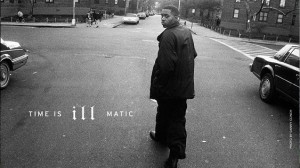 For SF WEEKLY: In a YO! MTV Raps interview in 1994, a month after his debut album Illmatic was released, 20-year-old rapper Nasir “Nas” Jones told Fab Five Freddy that everything changed for him when he was just 7 years old. “The ghetto makes you think,” he said. “I used to think I couldn’t leave my projects. I used to think if I left, if anything happened to me, I thought it would be no justice or I would be just a dead slave or something. The projects used to be my world until I educated myself to see there’s more out there.” A picture of Jones at that age graces the cover of the album, which eventually went platinum, was a huge critical success, and is largely considered one of the greatest hip-hop albums not just of the 90s, but of all time.
For SF WEEKLY: In a YO! MTV Raps interview in 1994, a month after his debut album Illmatic was released, 20-year-old rapper Nasir “Nas” Jones told Fab Five Freddy that everything changed for him when he was just 7 years old. “The ghetto makes you think,” he said. “I used to think I couldn’t leave my projects. I used to think if I left, if anything happened to me, I thought it would be no justice or I would be just a dead slave or something. The projects used to be my world until I educated myself to see there’s more out there.” A picture of Jones at that age graces the cover of the album, which eventually went platinum, was a huge critical success, and is largely considered one of the greatest hip-hop albums not just of the 90s, but of all time.
A new film by One9 and Eric Parker, Time is Illmatic, helps explain the backstory, not just of how Jones grew up with his older brother, mother, and traveling jazz musician father in housing projects in Queensbridge, New York, but also the trajectory of “Nasty Nas” as a hip-hop artist. Time is Illmatic premiered April 16th on the opening night of the Tribeca Film Festival.
The film makes it clear that Nas is a product of his neighborhood: ineffective local schools and constant dealings with drugs and violence that would eventually claim the life of his best friend and first DJ, Willy “Ill Will” Graham and injure his older brother. But it’s the same neighborhood that had music jams in the park with people wearing “happy, colorful clothes” and provided the musical mentors he encountered early on: rapper Roxanne Shante, producer Marley Marl, and many more. Women make few appearances in the film, but Jones gives much credit to his mother for raising him and his brother and providing a loving home.
Time, or the passing of it, is a key facet to the film. Growing up during the crack epidemic of the 80s and early 90s, Nas eventually drops out of school but learns from his father’s diverse book collection: “Egyptian Book of the Dead,” “Aesops Fables,” the Bible, Chinese proverbs. Fierce competition from hip-hop acts from New York’s other boroughs fuels his urge to improve. By the time he records “Illmatic,” lyrics he’s been working on for years develop into a unique, authentic combination of braggadocio, insight, philosophy, and poetry. His brother, pointing at an “Illmatic” album photo with a dozen or so friends from Queensbridge, confirms that most of them have since been incarcerated. “I felt like I had to be a man early,” he says in the film. 2013 footage shows the Hiphop Archive and W. E. B. Du Bois Institute at Harvard University establishing the Nasir Jones Hiphop Fellowship.
Rappers and producers in the film credit Nas as having a rare, exceptional intellect in his lyrics; an ability to exude the toughness of poor city life and but provide context at the same time. “It’s not just the words themselves, but it’s about an emotion,” the rapper MC Serch, who helped facilitate Nas’ first record deal, explains in the film. At an invite-only screening of the film this week at the Fox Theater in Redwood City, Nas described his style as “reality rap.”
The venture capital firm Andreessen Horowitz hosted the packed-house event, at which Nas spoke briefly before the film and sat for a Q&A afterward with firm partner Ben Horowitz (Nas had previously interviewed Horowitz at SXSW about Horowitz’s latest book). Questions from the audience focused less on Nas’ music than on larger, complex issues of race, class, and education in America.
A man from Brooklyn who said he was born in the 90s said Nas lyrics “raised us.” When asked if he has “survivor’s guilt” since leaving the Queensbridge projects, he admitted to feeling a bit stuck between two worlds: “Too hard for Hollywood circles and too rich for the hood that birthed you,” he joked.
One audience member asked how Nas felt about online communities like Rap Genius that take his lyrics, thus potentially stealing his and other artists’ intellectual property. Nas didn’t go into detail about his thoughts on intellectual property but confirmed that he is an investor in the site and said platforms like Rap Genius can bring his lyrics to a larger audience. He has an account at Rap Genius and explains his own lyrics and those of rappers he admires.
He admitted to once having a Commodore 64 (1980s home computer) and promoted the benefits of bringing more tech into low-income, inner-city neighborhood schools: “It would be cool to make school cool, to make kids actually happy to be walk in the door and be there,” he said, which elicited applause.
One guest asked what Jones would say to his younger self if he could: “Back in the day I used to say to people in the neighborhood, ‘This is boring. The cops know us. We’re not slick. This isn’t working. Let’s do something else.’ I’m still saying that now.”
“Time is Illmatic” screens Oct 19 and 21 at the Fox Theater in Oakland.
Photo by Danny Clinch, promotional image for “Time is Illmatic”



